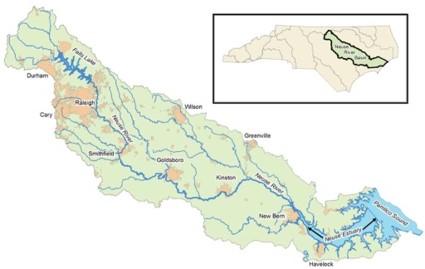Local Rules
Wake County's stormwater management regulations may be found in Article 9 of the Wake County Unified Development Ordinance. These regulations establish minimum requirements to address adverse effects of stormwater runoff associated with new development. The rules are primarily focused on nutrient management.
Wake County administers stormwater regulations for all unincorporated areas as well as three municipalities through interlocal agreements: Wendell, Rolesville and Zebulon.
Both Falls Lake and Jordan Lake are considered polluted due to excessive nutrient inputs, and stormwater runoff is one of the major sources. As a result, both lakes have been designated as Nutrient Sensitive Waters (NSW) by the North Carolina Division of Water Quality (DWQ). The Falls Lake and Jordan Lake rules passed by the State require local governments to adopt stormwater standards for new development. The State’s Falls Lake rules became effective January 15, 2011, and the Jordan Lake rules became effective August 11, 2009 but are on hold until further notice.
Click here to view the new Stormwater Rules for New Development in the Falls and Jordan Lake Basins
State Rules

Algal blooms and fish kills in the lower Neuse River during 1988 led to state rules for controlling nutrients in the Neuse basin. The rules cover agriculture, urban development and wastewater treatment plants.
Wake County is one of 15 local governments that enforce the Neuse Stormwater Rules codified in 15A NCAC 2B .0235. Wake County requires compliance with the Neuse Rules throughout the County (including within the Cape Fear Basin). The stormwater rules require protection of riparian buffers, peak flow control and nitrogen control from new development.
The Neuse Rules were re-adopted in April 2020 and codified in 15A NCAC 2B .0700. As part of the changes, 15 additional local governments have included for compliance. These include Morrisville, Knightdale, Wendell and Rolesville. Wake County provides stormwater plan review for Wendell and Rolesville in support of these rules. (Zebulon is not a Neuse named community).
Wake County submitted a local stormwater management plan to the State for review in early 2022. Approval of Wake County's plan is pending.
Local Program requirements:
- Ensure enforcement and compliance with stormwater requirements
- Ensure maintenance of Stormwater Control Measures
- Public education plan to inform the public about reducing nutrient pollution
- Mapping program for MS4, waters of the state, land use types, sanitary sewers
- Illicit Discharge Detection & Elimination program
Federal Rules
The federal Clean Water Act of 1972 focused initially on discharges from sources such as industrial and municipal wastewater treatment plants. Water quality studies have shown that more diffuse sources of pollution are also a problem. In 1987, Congress added requirements for non-agricultural sources of runoff, beginning with the largest cities and certain industries.
The Water Quality Act of 1987 placed emphasis on non-point sources of pollution and regulated municipal stormwater runoff. The 1990 Phase I regulation required medium and large cities or certain counties with populations of 100,000 or more to obtain NPDES permit coverage for their stormwater discharges. The 1999 Phase II regulation required small MS4s in U.S. Census Bureau defined urbanized areas, as well as MS4s designated by the permitting authority, to obtain NPDES permit coverage for their stormwater discharges. Phase II also includes non-traditional MS4s such as public universities, departments of transportation, hospitals and prisons.
Wake County submitted an application for coverage in 2004 but the State determined that Counties without MS4s (municipal separate sewer systems) were not required to comply with NC NPDES Phase 2.
Wake County has interlocal agreements with six (6) municipal governments including Garner, Morrisville, Knightdale, Wendell, Rolesville and Zebulon. Of these, all but Rolesville are Phase 2 communities. Wake County provides stormwater plan review for Wendell and Zebulon in support of Phase 2.
